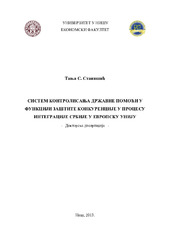Приказ основних података о дисертацији
Sistem kontrolisanja državne pomoći u funkciji zaštite konkurencije u procesu integracije Srbije u Evropsku Uniju
System of controlling state aid in function of protection competition in the process of Serbian integration in the European Union
| dc.contributor.advisor | Stojanović, Boban | |
| dc.contributor.other | Milenković-Kerković, Tamara | |
| dc.contributor.other | Maksimović, Ljiljana | |
| dc.creator | Stanišić, Tanja S. | |
| dc.date.accessioned | 2016-01-05T13:20:35Z | |
| dc.date.available | 2016-01-05T13:20:35Z | |
| dc.date.available | 2020-07-03T16:00:09Z | |
| dc.date.issued | 2013 | |
| dc.identifier.uri | http://eteze.ni.ac.rs/application/showtheses?thesesId=1286 | |
| dc.identifier.uri | https://nardus.mpn.gov.rs/handle/123456789/3855 | |
| dc.identifier.uri | https://fedorani.ni.ac.rs/fedora/get/o:855/bdef:Content/download | |
| dc.identifier.uri | http://vbs.rs/scripts/cobiss?command=DISPLAY&base=70052&RID=533590166 | |
| dc.description.abstract | Abstract: Synchronized efforts in the field of monitoring and control activities of the company in the market, as well as activities of the state, are precondition of the existence of effective competition policy. State aid as a form of selective government interventions aimed to individual companies, sectors and regions, can distorts competition in the market. Hence, the establishment and consistent implementation of the system of controlling state aid as an important part of the competition policy are necessary. The theoretical - methodological base of the system of controlling state aid is exposed in this research. The concept of state aid is determined precisely and the steps in the process of system building are systematized. The study further highlights compatibility between state aid control and protection of competition. A wide range of effects of state aid on competition process requires consideration of potential changes in costs, revenue, market behavior and market share of state aid beneficiaries. Valid conclusions about the impact of state aid on competition and social welfare are formulated in the research by extending standard microeconomic model with assumption of state aid. The EU system of state aid control is identified and analyzed as the most efficient existing system. Understanding its legal basis is a good starting point in designing of national system of state aid control. Identifying the trend in the European Commission work, as the body responsible for the state aid control in the EU, allows the formulation of guidelines for future action of national monitoring authorities. Review of achieved results in the system of state aid control in Serbia, as a new theoretical and practical concept, is carried out through comparison with the EU system and the systems of the countries in the region. In this way, we systematized the existing deficiencies and formulated recommendations for further development that would lead to increased transparency and efficiency of the Serbian system. Comparative examination of trends in granted state aid pointed to negative deviations in Serbia in relation to good practice of European Union. We identified areas to which Serbia should direct state aid in the future. The objective of doctoral dissertation is pointing out the great importance of the system of controlling state aid as the field of competition policy and the need for a serious approach to the process of its construction. The purpose of the research is identifying existing weaknesses and possible directions of further development of system in Serbia. In accordance with the objective and the purpose of the research, various methods are applied in iv this study. The method of comparative legal analysis is widely used in comparison obtained solutions in Serbia with the country in the region and with the best international practice. Microeconomic models, with their extension by assumption of existence of state aid, were used to isolate channels of impact of state aid on competition. Statistical methods (descriptive statistics, cluster analysis, correlation analysis) allowed the identification of the causal relations between researched variables. The graphical representation is used to make conclusion about relevant regularities of manifestation of the state aid on the basis of existing data. The research presents more complete analytical coverage of issues of state aid control, which is new in domestic scientific and professional community. Research results created the basis for learning from positive and negative experiences of countries that regulated this very important issue (for both, protecting competition and the efficient use of public funds) much earlier than Serbia. | en |
| dc.format | application/pdf | |
| dc.language | sr | |
| dc.publisher | Универзитет у Нишу, Економски факултет | sr |
| dc.relation | info:eu-repo/grantAgreement/MESTD/Basic Research (BR or ON)/179066/RS// | |
| dc.rights | openAccess | en |
| dc.rights.uri | https://creativecommons.org/licenses/by/4.0/ | |
| dc.source | Универзитет у Нишу | sr |
| dc.subject | Konkurencija | sr |
| dc.subject | state aid | en |
| dc.subject | competition | en |
| dc.subject | control | en |
| dc.subject | Serbia | en |
| dc.subject | European Union. | en |
| dc.subject | Zaštita konkurencije | sr |
| dc.subject | državna pomoć | sr |
| dc.subject | kontrola | sr |
| dc.subject | Европска унија | sr |
| dc.title | Sistem kontrolisanja državne pomoći u funkciji zaštite konkurencije u procesu integracije Srbije u Evropsku Uniju | sr |
| dc.title | System of controlling state aid in function of protection competition in the process of Serbian integration in the European Union | en |
| dc.type | doctoralThesis | en |
| dc.rights.license | BY | |
| dcterms.abstract | Стојановић, Бобан; Миленковић-Керковић, Тамара; Максимовић, Љиљана; Станишић, Тања С.; Систем контролисања државне помоћи у функцији заштите конкуренције у процесу интеграције Србије у Европску Унију; Систем контролисања државне помоћи у функцији заштите конкуренције у процесу интеграције Србије у Европску Унију; | |
| dc.identifier.fulltext | https://nardus.mpn.gov.rs/bitstream/id/51783/Disertacija.pdf | |
| dc.identifier.fulltext | http://nardus.mpn.gov.rs/bitstream/id/51783/Disertacija.pdf | |
| dc.identifier.rcub | https://hdl.handle.net/21.15107/rcub_nardus_3855 |


